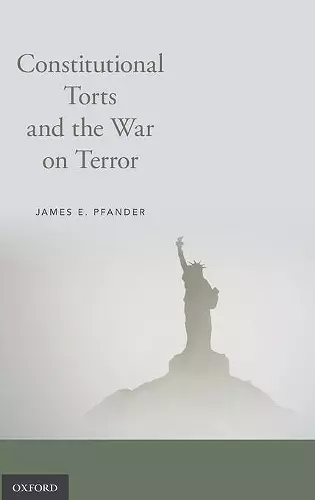Constitutional Torts and the War on Terror
Format:Hardback
Publisher:Oxford University Press Inc
Published:23rd Feb '17
Currently unavailable, and unfortunately no date known when it will be back

Constitutional Torts and the War on Terror examines the judicial response to human rights claims arising from the Bush Administration's war on terror. Despite widespread agreement that the Administration's program of extraordinary rendition, prolonged detention, and "enhanced" interrogation was torture by another name, not a single federal appellate court has confirmed an award of damages to the program's victims. The silence of the federal courts leaves victims without redress and the constitutional limits on government action undefined. Many of the suits seeking redress have been based on the landmark 1971 Supreme Court decision in Bivens v. Six Unknown Named Agents of the Federal Bureau of Narcotics. This book traces the history of common law accountability, the rise of Bivens claims, and the post-Bivens history of constitutional tort litigation. After evaluating the failure of Bivens litigation arising from the war on terror, the book considers and rejects the arguments that have been put forward to explain and justify judicial silence. The book provides the Supreme Court with the tools needed to rethink its Bivens jurisprudence. Rather than treating the overseas national security context as disabling, modern federal courts should take a page from the nineteenth century, presume the viability of tort litigation, and proceed to the merits. Only by doing so can the federal courts ensure redress for victims and prevent future Administrations from using torture as an instrument of official policy.
From William Blackstone to William Brennan, from John Marshall to the younger John Marshall Harlan, many of our greatest jurists have championed the remedial imperative-the need for robust judicial remedies to vindicate basic legal rights. In this wise and careful book, one of the best legal minds of the current generation, James Pfander, reinvigorates this grand legal tradition, explaining how ancient legal principles must be refreshed to meet modern challenges." Akhil Reed Amar, Sterling Professor of Law and Political Science, Yale University
Not a single U.S. official who participated in torture in the wake of 9/11 has been held accountable for his actions; many victims have sued, but not a single one has received compensation. James Pfander offers a bracing account of judicial abdication in the face of brutal illegality, and a cogent and persuasive argument for the resurrection of the judiciary's role in holding government wrongdoers accountable for unconstitutional national security initiatives in the future." David Cole, Professor, Georgetown University Law Center
But the juxtaposition of Jim Pfanderâs erudite and magisterial new monograph, Constitutional Torts and the War on Terror, and the Supreme Courtâs June 19 decision in Ziglar v. Abbasi, suggests a different (and more alarming) possibility: The problem is not that law professors are failing to produce scholarship of utility to contemporary judges; the problem is that the scholarship that is out there just is not getting read. How else to explain both the result and the reasoning in Abbasiâa decision deeply hostile to judge-made damages remedies for constitutional violations by federal officers, and one that is shamelessly indifferent and stunningly oblivious to the rich history and tradition of such remedies that has been well- and long-documented in the academic literature, most powerfully in Pfanderâs book. * Steve Vladeck, JOTWELL *
ISBN: 9780190495282
Dimensions: 239mm x 155mm x 25mm
Weight: 499g
274 pages